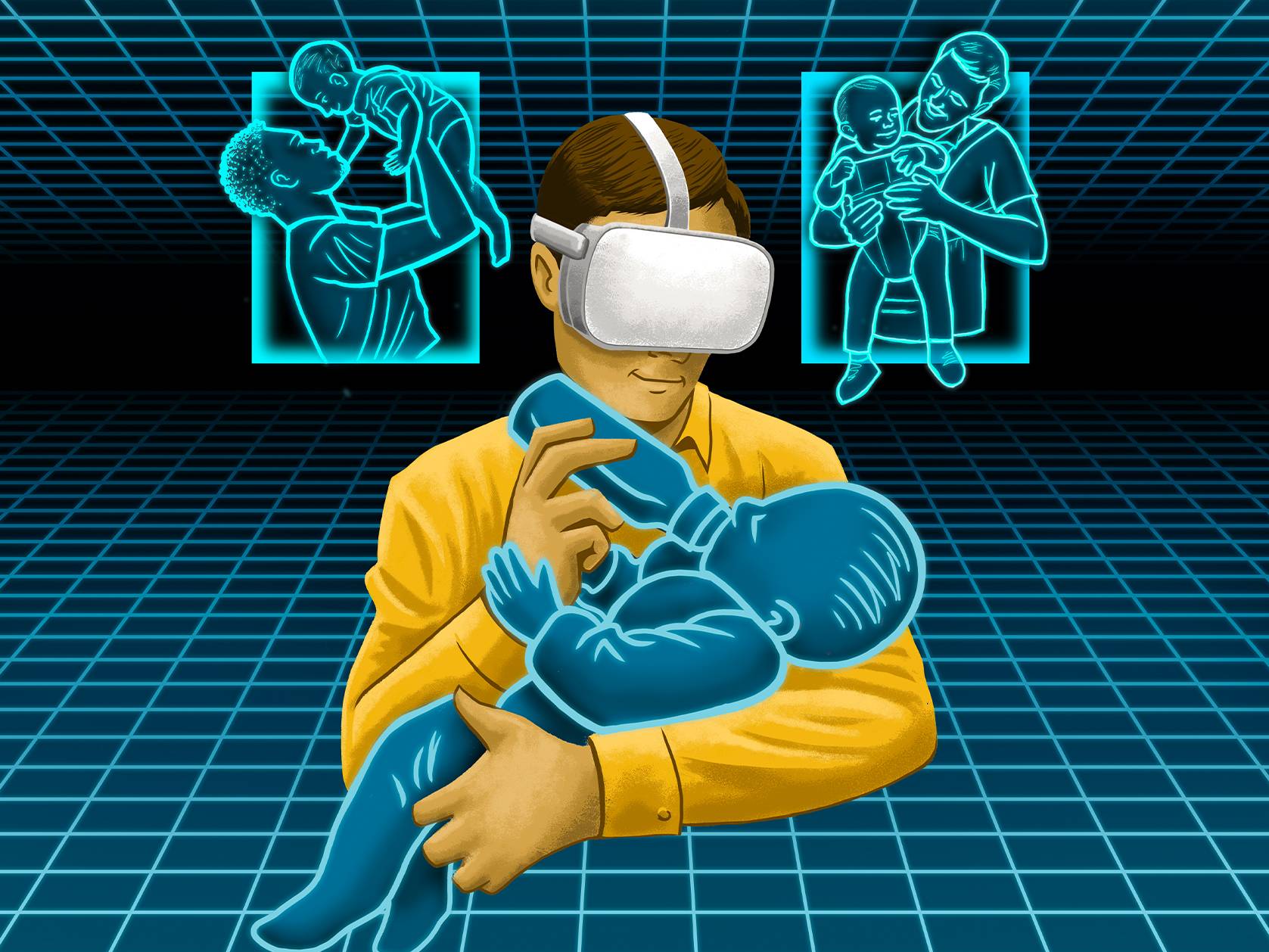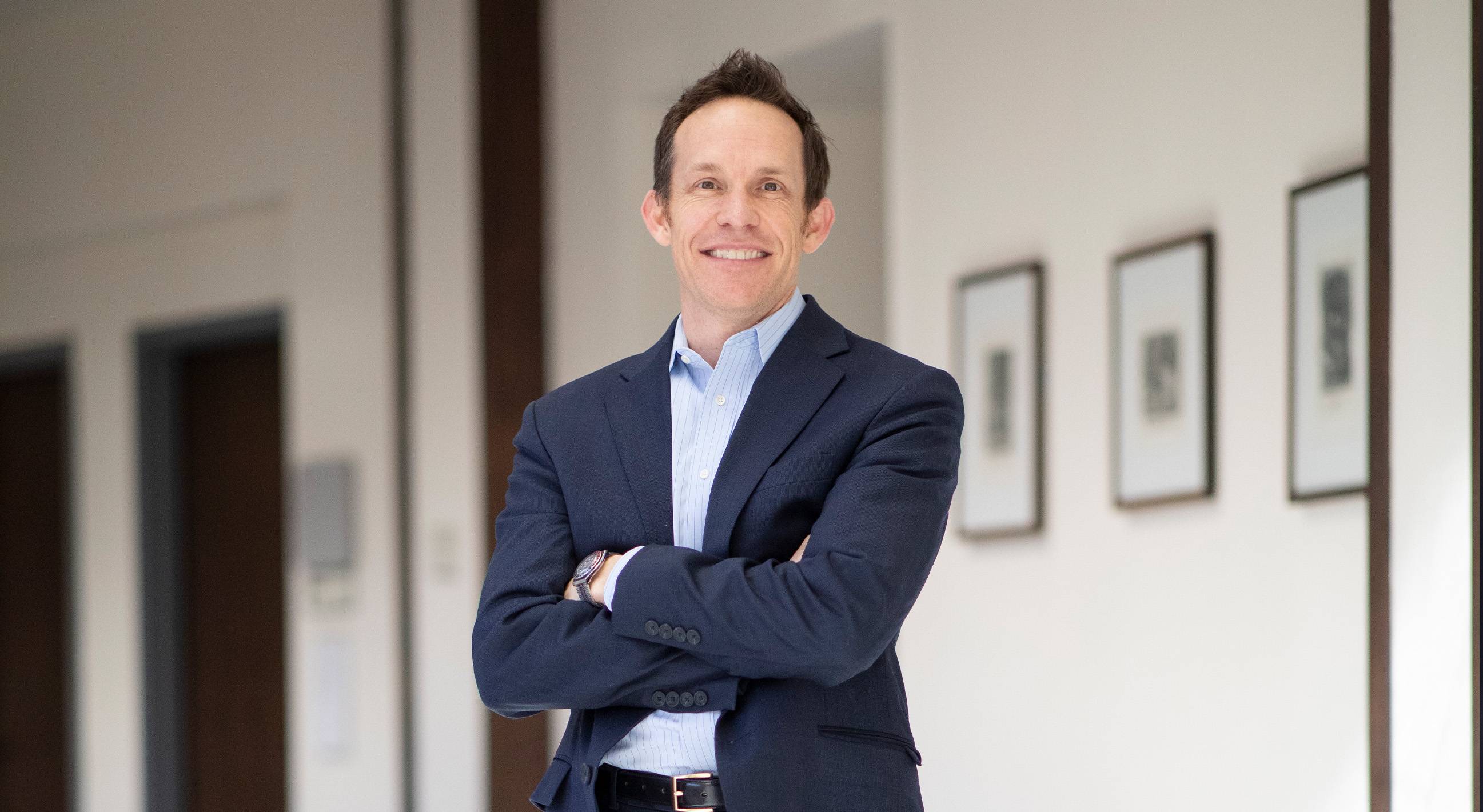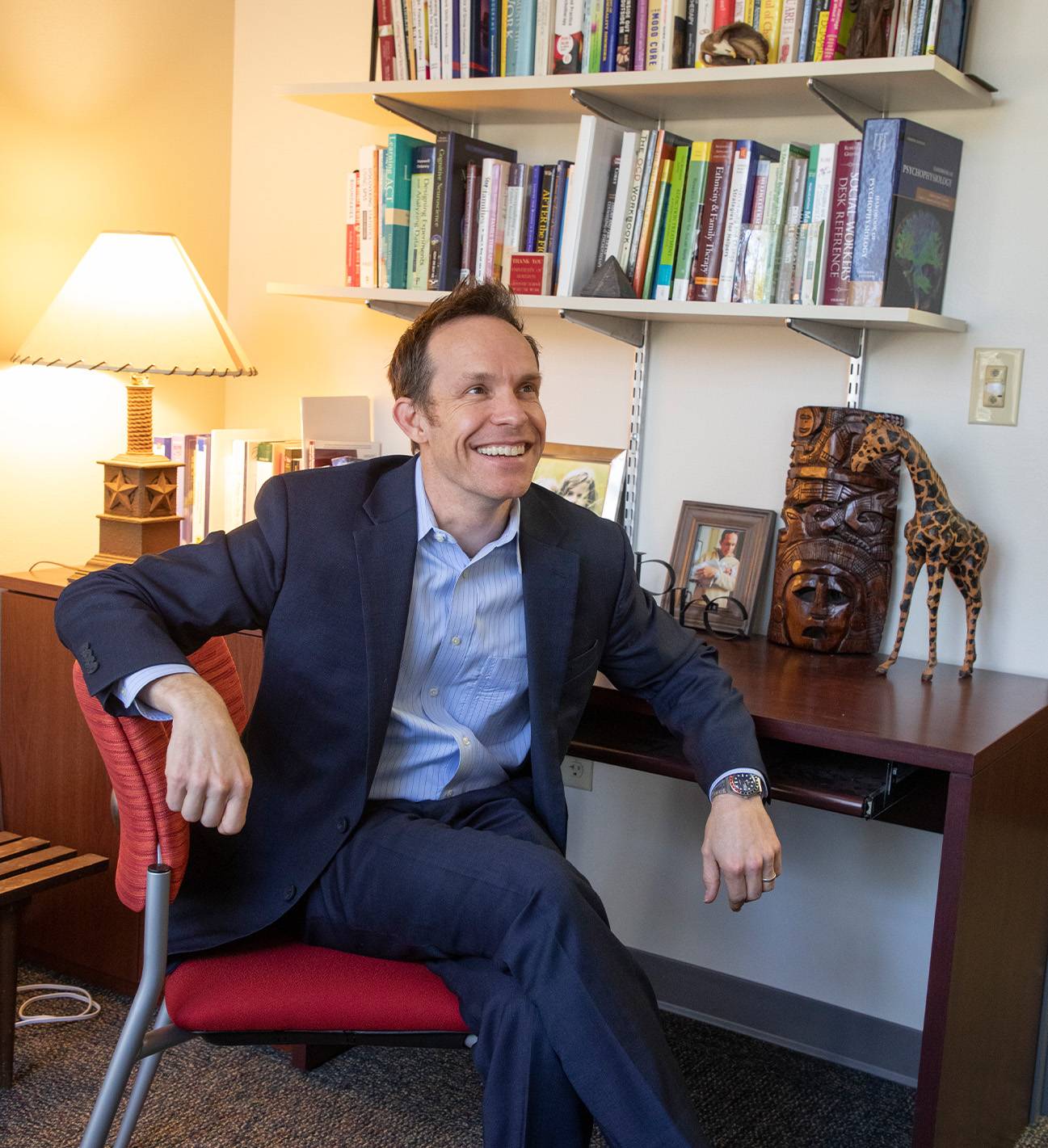
Dr. Mark Trahan leads a team developing a virtual reality app to coach parents through emotional early days
By Steve Ulfelder
It’s an understatement to say early parenthood can be stressful. Sleeplessness, depression, and financial worries beset many young parents — all as they try to handle the biggest responsibility of their lives. For vulnerable fathers, the situation can be even more difficult. A team at Texas State University is addressing the situation, developing tools that fathers can access through the most familiar of devices: the smartphone. Dr. Mark Trahan, an associate professor in the School of Social Work, spearheads the research using virtual reality/augmented reality (VR/AR) to bolster paternal and social self-efficacy. As a researcher and the father of two, Trahan is interested in finding ways that technology can address and reduce the stress of parenthood.
While it’s far too early to declare victory, research and case studies performed by Trahan and Texas State show great promise. That’s important to the university as a whole and to the College of Applied Arts, notes Dr. T. Jaime Chahin, dean of the college and a supporter of Trahan’s work. “Fathers and mothers are the foundation of the family,” Chahin notes, “and their efforts have to be continuously reinforced.”

Apps Were Lacking
Trahan, who is always exploring ways to increase young fathers’ confidence in their parenting skills, says his curiosity was first piqued when he and colleagues studied smartphone apps devoted to parenting. Some may be surprised at the sheer number of these apps — there are well over 100 such tools, developed by government agencies, social-services providers, faith-based groups, and for-profit companies.
Trahan focused on assessing the quality of free and low-cost apps for fathers. “We were interested in these because when services are provided for parents, sometimes an app is used as a supportive measure,” Trahan says. “We wondered whether the content in these apps applied to fathers, specifically low-income fathers, who may be experiencing many levels of stress.” The powerhouse interdisciplinary team includes Dr. Vangelis Metsis, associate professor in the Department of Computer Science; Dr. Richard Morley, associate professor in the School of Social Work; Dr. Erica Nason, assistant professor in the School of Social Work; Nate Rodrigues, assistant professor in the Department of Respiratory Care; and Dr. Scott Smith, associate professor in the School of Social Work and director of the Virtual Reality and Technology Lab.
They soon discovered that available apps left significant gaps. For starters, very few were developed specifically for fathers and regardless of gender, the apps may not address the real needs of parenting. While helpful in their way, “the apps aren’t really touching on the issues that are needed to increase a father’s self-efficacy and confidence in parenting,” Trahan says.
“Many young dads come into parenthood with very little emotional knowledge. We often see depression or frustration with work or school. This impacts their ability to ‘show up’ the way parents need to.”

Parenting Challenges
In existing parenting apps, content on research-based issues of fatherhood engagement was seldom present. “Very few dealt with the emotions fathers feel, co-parenting with a partner, parenting stress, or challenges such as mental health or substance abuse,” he adds. “We know something about what confidence looks like in the parenting realm, what that feels like — and few [apps] had any dimensions related to what we know supports increased confidence.”
Nevertheless, Trahan’s team learned that the apps had one powerful factor going for them: “Fathers like them,” he says. Younger, tech-savvy dads, for whom a smartphone app is a familiar part of life, enjoy referring to the software and using it to communicate and learn. The quest to assist fathers would soon merge with another of Trahan’s interests: the use of virtual reality to help veterans at Texas State overcome anxiety and distress.
For the past five years, Trahan and a team of faculty and students has been developing a virtual environment for providing VR exposure therapy (VRET) to treat anxiety disorders and post-traumatic stress disorder in veterans at Texas State. PTSD, often faced by previously deployed combat veterans, is of particular interest at the university, which is proud of its commitment to the military.
“We started this project because we saw a need for veterans to adjust to social situations on campus that could be highly anxiety producing,” Trahan says. “We found that developing specific scenarios and environments to assist them in overcoming their anxiety could help with becoming more comfortable on campus.” In the treatment of anxiety disorders, exposure-based exercises — in which subjects are placed in anxiety-provoking but safe situations — are widely used and highly regarded. But because such exercises aren’t always feasible, especially in the age of COVID, Trahan’s team developed a VR-based experiment. A student veteran with social anxiety disorder and PTSD completed 12 sessions of VRET using a mobile phone simulation of a virtual grocery store, which represents the sort of environment that can intimidate those suffering from anxiety disorders.
Expanding VR Work
Make no mistake: The COVID-19 pandemic has affected psychological health services, just as it has affected many other aspects of our lives. The new importance of social distancing, combined with the widespread acceptance of telehealth in medicine, including clinical social work, makes a phone-based VR app timely and important. Such apps in the mental health space are considered cost-effective, Trahan notes, and they have the potential to be embraced by clients — including vulnerable fathers — who aren’t likely to seek out in-person services. The team’s initial research results appear promising.
While interrupted by COVID, an initial feasibility case study reported decreases in psychological symptoms, better sleep quality, and other positive changes. The results, published in Clinical Social Work Journal, suggested that VRET using a mobile app is feasible and worthy of additional research.
“The study with veterans helped guide my understanding of using very specific physiological measures to understand the stress response,” Trahan says. “Now we’ll use those methods to focus on young fathers and how we can assist them to adapt to the stress of becoming a new parent.” With this early research pointing the way, Trahan and the university team are poised to take exciting next steps in the VR arena — both to develop a VR app for fathers and to expand on their VRET work.
“We’re just starting on the fatherhood project,” Trahan says. The team will begin by collecting interviews with young fathers in their first six weeks of parenthood. “We really want to find out what things they notice — their response to a crying child, for example, their ability to pick up on emotional cues.” He notes that this is the beginning of exploring specific interventions that could assist young fathers in adapting to stress. From there, the team hopes to develop a scenario that will allow fathers to learn in a VR environment. It’s all part of the effort to use cutting-edge technology to address one of humankind’s oldest problems: stress. ★